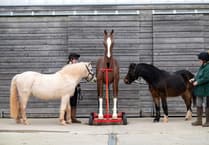Sarah Pitt meets the vicar of Tavistock, the Very Rev Dr Chris Hardwick, to talk about his love of cooking, how food is intertwined with his Christmas Day celebrations and just how he prepares all the elements of his family Christmas dinner. Ingredients for the feast are sourced on his doorstep in Tavistock
TAVISTOCK’S parish priest the Very Rev Dr Chris Hardwick is gearing up for his busiest time of year.
The annual celebration of the birth of the Christ child will see the vicar rarely out of his robes as he presides over services in the parish church, the Church of St Eustachius.
But when the busy programme of Christmas services is over on the afternoon of Christmas Day, he will be back at home at the vicarage, donning his apron.
He will be preparing Christmas dinner for himself, his wife Sarah and as many of their five children — some grown, some still at home — who can make it for the feast. The family will join him in the kitchen as he cooks.
‘For us the kitchen is a very sociable place,’ said Chris. ‘We have a lot of fun in the kitchen. There’s a lot of banter around, lots of “I wouldn’t do it like that”.’
As Chris’s wife Sarah is just as much of a cook as he is, they generally share the family cooking.
Chris first learned to cook from his mother as a child, watching and helping. Later, he taught himself to cook and as an adult he’s got really good, cooking for the family and doing demonstrations for church fundraisers — he prepared a five-course meal in the parish rooms in Tavistock in February which included his speciality, beef Wellington.
He is an enthusiastic reader of cookery books, being a particular fan of celebrity chef Gordon Ramsay’s culinary wizardry. And he swears by Nigella Lawson’s roast potatoes. When it comes to Christmas dinner, he said he doesn’t like to go too overboard on ‘all the trimmings’.
‘I don’t really do that,’ he said. ‘I prefer to do a few things that have really nice flavours. Although of course, as it is Christmas, we will definitely be having pigs in blankets.’
He added: ‘It is not about a mountain of food on the plate, it is about a modest amount of food cooked well with good flavours.
‘We do sprouts but we tend to cook sprouts with lardons, which of course was not at all how we would have had them at home when I was young. Carrots we might have glazed, perhaps with honey, something sweet.
‘We do have turkey on Christmas Day, we are fairly traditional in that respect. To keep the turkey moist I prepare a butter paste with some lemon rind and herbs and mix it up at room temperature and season it again with salt and pepper. I put that mixture under the skin to give a really good flavour.
‘I’ll also put half a lemon inside the turkey and half an onion. I find putting this into the cavity and putting the butter and herb mixture under the skin makes a real difference to how moist the meat is as well as the flavour. Towards the end of the cooking, I put bacon on the top for flavour.’
He is also particular about the way the roast potatoes are prepared.
‘I’ve come to the conclusion — and I’m not on her payroll — that Nigella’s roast potatoes are the best,’ he said.
‘They are cooked in goose fat and, once again, they are not something you would eat every day but it does give the best flavour. I like Maris Piper — that is what I would use so they are a decent size. I would peel them, parboil them then season them well with pepper. I use less salt in my cooking these days, but I do use some.
‘I then put a tea towel over the pan so it is basically like steaming them. Then I’ll shake them up a bit to roughen up the edges and then dust them with semolina.
‘Then in the oven you need to get your goose fat to a high temperature and then transfer the potatoes into the goose fat. You then baste them and keep an eye on them — you need to turn them at least once. That will make fantastic roast potatoes.
‘The other ingredient for the Christmas dinner, which I think is hugely important, is gravy,’ he said.‘I’m in awe of professional chefs and cooks who have learned all the techniques for making stocks. I have learned that taking time with gravy and stocks, building and adding flavours, is so important.
‘I will use some of the turkey juices, taking off the fat, putting the onion in which has been cooking inside the turkey, and then adding a dash of wine, mashing it down and reducing it.
‘I prefer to strain my gravy, but I know some people prefer it with bits in so I will often put two gravy boats on the table.’
For Chris, food has been a lifelong passion — starting in those days back in the 1960s growing up in Lichfield, Staffordshire, where his mother cooked from scratch and regularly entertained. The young Chris would accompany her to the shops to buy the ingredients for their meals.
‘We would go to the butcher, the greengrocer and the delicatessen, all individual shops, because supermarkets were not as they were today, out of town. We would buy what we could carry and went to individual shops.’
He said now living in Tavistock and going out to buy the ingredients for his family, he was reliving those childhood days.
‘I think the beauty of Tavistock is we have exactly this, local shops, greengrocers, butchers and delicatessens. I use them all. It helps me when I am planning on cooking something new as I can find what I want.
He added: ‘I think it is incredibly important to support local businesses. Their produce is all locally sourced, good quality and reasonably priced. I can also find the spices I want in the pannier market.’
Chris’s enthusiasm for cooking is such that I can’t resist asking — would he rather have been a chef than a vicar?
Here, though, the man who has been an ordained priest for nearly 30 years doesn’t hestitate.
‘Oh no,’ he said. ‘This is a hobby and I keep it as a hobby. I find it really relaxing.
‘It is a completely different way of being when I’m in the kitchen. I’m a vicar, though, not a chef. I wouldn’t want to be anything else.’





Comments
This article has no comments yet. Be the first to leave a comment.